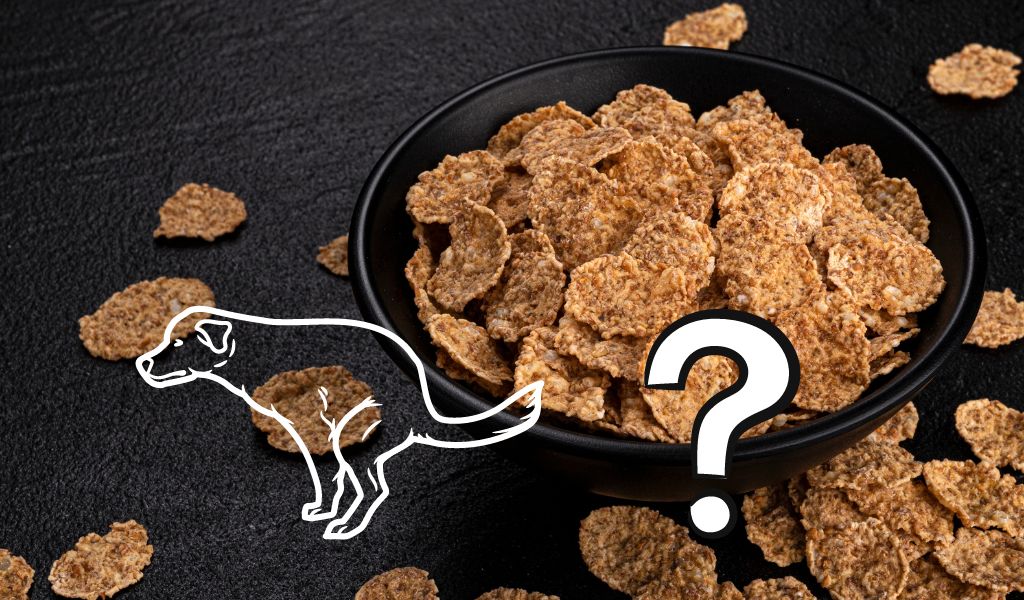As pet owners, we all want our dogs to be healthy and happy.
One of the essential aspects of their wellbeing is their digestive system.
If your dog is struggling with constipation or irregular bowel movements, you may have heard that bran flakes can help.
In this article, we’ll explore the benefits and potential drawbacks of adding bran flakes to your dog’s diet, as well as the best ways to incorporate it into their meals.
Bran flakes can help your dog when he goes to the toilet. The high fibre content can help to keep your dog regular and the additional nutrients contained in bran flakes will benefit his health and overall condition.
Will bran flakes help my dog poop? Understanding the basics
Before we delve into whether bran flakes can help your dog poop, it’s important to understand the basics of constipation in dogs.
Constipation is a common problem among dogs, particularly as they age.
It can occur due to various reasons such as lack of fibre in their diet, dehydration, medication side effects, and even stress.
Some of the symptoms of constipation include straining while defecating, dry and hard stools, and infrequent bowel movements.
The benefits of bran flakes for dogs
Bran flakes are an excellent source of fibre, which can help promote bowel movements in dogs.
The insoluble fibre in bran flakes adds bulk to their stool, making it easier to pass through their digestive system.
Apart from aiding in digestion, fibre also has other health benefits for dogs.
It can help regulate blood sugar levels, lower cholesterol, and prevent obesity.
Additionally, the B vitamins and minerals present in bran flakes can also contribute to your dog’s overall health.
How bran flakes help your dog poop
• Bran flakes can be beneficial for dogs struggling with constipation or irregular bowel movements.
• An increase in fibre can add bulk to their stool and help promote regular bowel movements.
• Bran flakes are also a good source of B vitamins and minerals that promote overall health.
• It’s important to consult with your veterinarian before adding bran flakes to your dog’s diet and increase it gradually over time to avoid gastrointestinal issues.
• Feeding your dog a balanced and nutritious diet, providing plenty of water, and regular exercise will keep their digestive system functioning properly.
How to incorporate bran flakes into your dog’s diet
If you’ve decided to add bran flakes to your dog’s diet, it’s important to do so gradually.
A sudden increase in fibre can cause gastrointestinal issues, such as bloating, wind, and diarrhea.
Start by adding a small amount of bran flakes to their meals and gradually increase it over time.
It’s also crucial to make sure that the bran flakes you’re using are plain and don’t contain any added sugar or artificial sweeteners.
Too much sugar can lead to weight gain, dental issues, and other health problems in dogs.
FAQs:
Q. Can all dogs eat bran flakes?
A. While bran flakes are generally safe for most dogs, it’s important to consult with your vet before adding it to their diet.
Dogs with specific medical conditions, such as pancreatitis or inflammatory bowel disease, may not tolerate high-fibre diets.
Q. How much bran flakes should I give my dog?
A. The amount of bran flakes your dog needs may vary based on their age, weight, and overall health.
It’s best to consult with your vet to determine the appropriate amount.
Q. Are there any potential side effects of giving my dog bran flakes?
A. Some dogs may experience gastrointestinal issues, such as wind and other things when they first have bran flakes.
It’s crucial to start with small amounts and gradually increase it over time to avoid such issues.
Conclusion and final thoughts
So, will bran flakes help my dog poop? The answer is yes, but it’s essential to introduce it gradually and consult with your veterinarian before doing so.
Bran flakes can be an excellent source of fibre and nutrients for your furry friend, but it’s crucial to ensure that you’re using plain bran flakes without any added sugar or artificial sweeteners.
Remember, a healthy digestive system is crucial for your dog’s overall wellbeing, so be sure to provide them with a balanced and nutritious diet, plenty of water, and regular exercise to keep their digestive system functioning smoothly.




